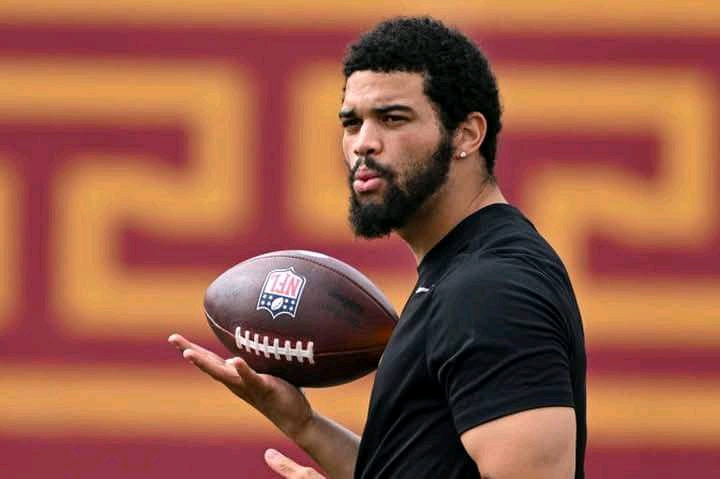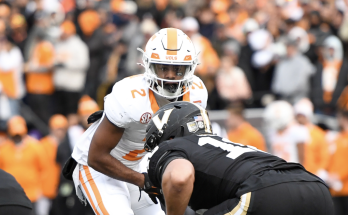The journey from high school football phenom to NFL starting quarterback is paved with intense competition, massive expectations, and the ever-watchful eye of the media. For Caleb Williams, the No. 1 overall pick in the 2025 NFL Draft, this path has not only tested his skills as a quarterback but also challenged his resilience, maturity, and character. While many athletes dream of reaching the NFL, few must navigate the overwhelming pressure and relentless scrutiny that Williams now faces daily. As he prepares to lead the Chicago Bears into a new era, the spotlight is brighter than ever—and so are the challenges that come with it.
A Star is Born: Williams’ Rise from High School to College Glory
Caleb Williams’ football journey began in Washington, D.C., where he quickly emerged as one of the most talented high school quarterbacks in the country. At Gonzaga College High School, Williams showcased a unique blend of arm talent, mobility, and on-field awareness. His performances not only earned him a five-star rating but also caught the attention of every major college football program in the nation.
Ultimately, Williams committed to the University of Oklahoma, where he joined head coach Lincoln Riley’s quarterback-friendly offense. It didn’t take long for him to make headlines. As a true freshman, Williams took over the starting role mid-season in 2021 after Spencer Rattler struggled. In a dramatic Red River Showdown against Texas, Williams led the Sooners to a thrilling comeback victory, instantly solidifying his status as a star.
His combination of dynamic playmaking and poise under pressure made him one of college football’s most talked-about quarterbacks. However, after the 2021 season, Williams made the surprising decision to enter the transfer portal, ultimately following Riley to the University of Southern California (USC).
Rebirth at USC: Stardom and Spotlight in Hollywood
Williams’ transfer to USC was seen as a seismic shift in college football. The Trojans, a once-dominant powerhouse looking to return to national relevance, now had a generational talent under center. In Los Angeles, Caleb Williams found a new stage—and a new level of scrutiny.
The 2022 season at USC was magical. Williams threw for over 4,500 yards and 42 touchdowns, earning the prestigious Heisman Trophy. He led the Trojans to an 11-3 record and a New Year’s Six bowl appearance, restoring national relevance to the program. With charisma, flair, and extraordinary skill, Williams became the face of college football.
But with stardom came increased pressure. His every move, both on and off the field, was dissected by fans and critics alike. Williams embraced the Hollywood spotlight, often displaying colorful nails with motivational messages and a confident demeanor. Yet, this outward bravado sometimes overshadowed the maturity and preparation that fueled his success.
In 2023, expectations were sky-high for Williams and the Trojans. USC began the season as a top-10 team, with many predicting a College Football Playoff berth. However, the season unraveled as the Trojans’ defense faltered and Williams was forced to carry the team weekly. Despite throwing for 30 touchdowns, the losses mounted, and criticism intensified. For the first time in his career, Williams experienced what it meant to lose on a big stage—and be blamed for it.
Mental Fortitude: Handling Losses and Media Scrutiny
What sets Caleb Williams apart isn’t just his physical ability—it’s his mental toughness. After a heartbreaking loss to Washington in 2023, a viral moment showed Williams in the stands, emotionally hugging his mother and crying. While some saw vulnerability, others perceived weakness. The moment became a lightning rod for discussion about athletes’ mental health and the pressures they face.
Williams responded with maturity, saying, “I play this game with my heart. Every win, every loss—it means everything to me.” His willingness to show emotion humanized him in an era where athletes are often expected to be stoic.
Still, the criticisms kept coming. Some questioned his leadership. Others questioned his decision to sit out USC’s bowl game. NFL scouts debated whether his expressive personality would mesh with the no-nonsense world of professional football. Caleb Williams was not just being evaluated as a quarterback—he was being dissected as a person.
Through it all, Williams stayed true to himself. He continued to work, block out the noise, and prepare for the next chapter. His confidence never wavered, even as public opinion did.



